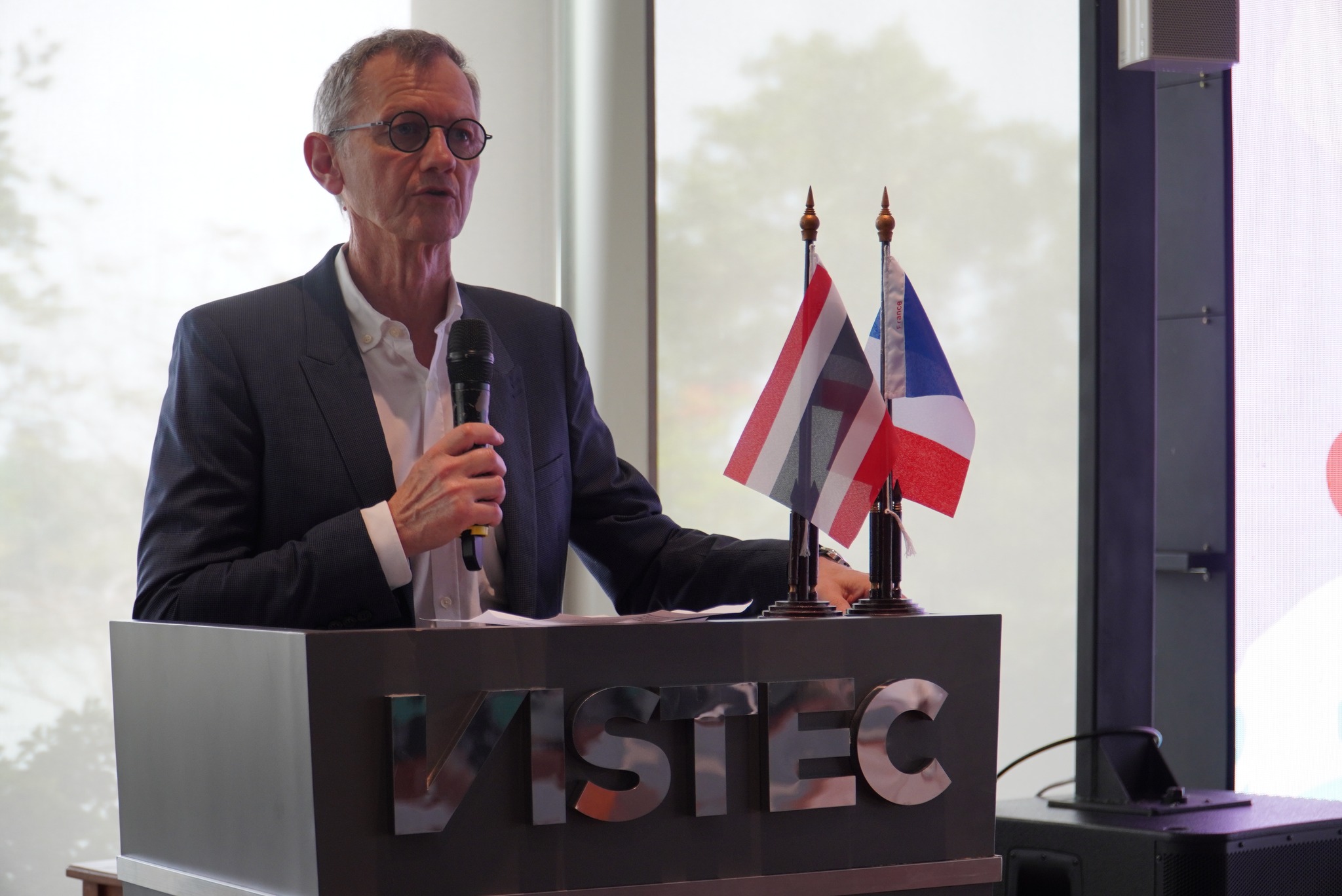
ChiraChem Project
International Research Project (IRP) « ChiraChem »
Principle investigators:
Prof. Alexander Kuhn / Bordeaux, France
Assoc. Prof. Dr. Chularat Wattanakit / School of Energy Science and Engineering / VISTEC, Thailand
Partners:
Prof. Adrian Flood / School of Energy Science and Engineering / VISTEC, Thailand
The roots
A very fruitful long-term collaboration thatstarted in 2006 with Prof. Jumras Limtrakul and continued in 2015 with Assoc. Prof. Dr. Chularat Wattanakit
Total output:
- >20 high impact publications
- >10 co-supervised PhD students
Precursor CNRS project: ChiraCat
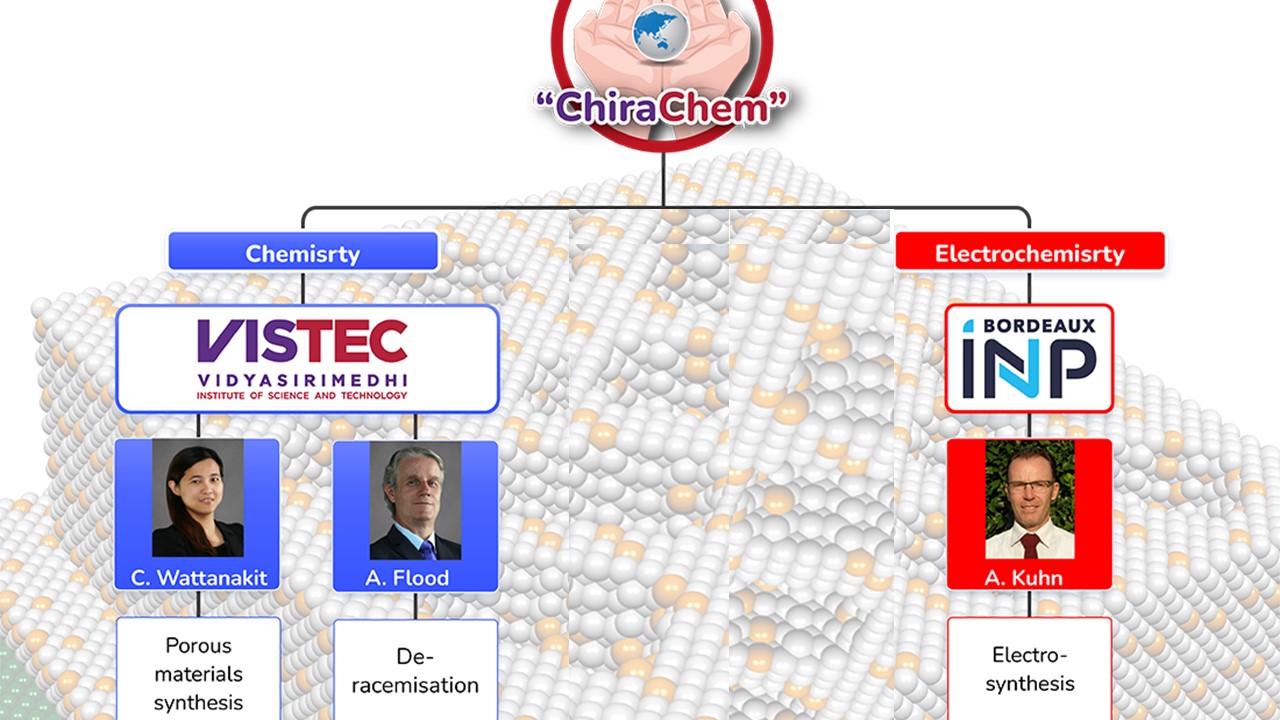
Website: IRP CHIRACHEM - CNRS Singapore
Summary of the kick-off meeting and symposium of the French-Thai Collaborative Project: 28 June 2022
The meeting and symposium were organized in a hybrid format. The event took place both onsite and online while all speakers gave their presentations onsite at VISTEC Central Lecture Theatre. The meeting began with the president of VISTEC, Professor Dr. Jumras Limtrakul, outlining the vision and path of VISTEC research development. President Jumras suggests that the most effective goal for VISTEC Frontier Research would be to have the best combination of "advancement of knowledge" and "immediate applications", aiming to be in line with the great research work done by Louise Pasteur. This would speed up the transfer of new frontier discoveries to significant uses.
Dr. Guillaume Da, Attaché for Scientific Cooperation and Higher Education from the French Embassy in Thailand, addressed the meeting that the French Embassy has been supporting universities and research centers in Thailand, and will continue to do so strongly. The establishment of joint curricula, mobility of staff and students between Thailand and France, and the promotion of higher studies are on the top agenda. He also emphasized the importance of the “Franco-Thai Year of Innovation” that started in 2022.
Professor Dominique Baillargeat, the regional director of the Center National de la Recherche Scientifique (CNRS) representative office in ASEAN based in Singapore, described the role of the CNRS as to establish and consolidate international research projects, and create mobility of researchers and students in ASEAN countries and France. He mentioned that the CNRS has developed 75 International Research Laboratories (IRL) with strategic partners across the world. There are currently 6 IRLs in Southeast Asia. Thailand has one IRL which is IRASEC. There are 7 International Research Projects (IRP) in ASEAN countries. One of the IRPs, which is ChiraChem, is in Thailand.
Assistant Professor Dr. Chularat Wattanakit presented the past achievements resulting from the collaboration between VISTEC and Bordeaux. The collaboration was highly successful and resulted in several publications in high-quality journals of the Nature Index category. Dr. Chularat also cited examples of students who went through the VISTEC-Bordeaux collaboration and who won several prizes and awards. Some of the graduates ended up working with the PTT group of companies. Before describing the IRP ChiraChem, Professor Dr. Alexander Kuhn of Bordeaux described the roots of a very fruitful long-term collaboration that started in 2006 with Professor Dr. Jumras Limtrakul and continued in 2015 with Assistant Professor Dr. Chularat Wattanakit. The outputs were impressive, with more than 20 high-impact publications and more than 10 co-supervised PhD students. Professor Kuhn also outlined the nature of the work of the IRP ChiraChem which involves principal investigators from Bordeaux and VISTEC, and partners from Rennes and VISTEC. He also hopes that the collaboration will continue even after the support to IRP ChiraChem ends in 2026.
Presentations on ChiraChem started with Professor Neso Sojic who spoke on “Ultrasensitive electrochemiluminescence microscopy of single entities: cells and mitochondria” where he used Chinese hamster ovarian (CHO) cells as a model for the work. He demonstrated that the electrochemiluminescence (ECL) technique is extremely sensitive and requires no external light source. The work has been extended to single-molecule ECL imaging.
Dr. Serena Arnaboldi presented her work on “Unconventional electrochemical approaches for chiral recognition” where she described enantioselective actuation with bipolar electrochemistry. In this case, the conversion of L-DOPA and D-DOPA to quinones was used as a model. Dr. Serena also presented the work on chiral-triggered autonomous motion while observing the swimmer architecture.
Mr. Sopon Butcha, a PhD candidate for the double degree program between Bordeaux and VISTEC, presented his work on “Asymmetric electrosynthesis of chiral molecules at modified chiral-encoded mesoporous metal surfaces” where he described the synthesis of chiral-encoded mesoporous Pt electrodes and the asymmetric synthesis of mandelic acid (MA) from phenylglyoxylic acid (PGA) using the chiral encoded metal. Another part of his work dealt with the improvement of the stability of the chiral Pt electrode by synthesizing the chiral-encoded mesoporous Pt-Ir alloy electrode.
Dr. Gerardo Salinas presented the work on “Hybrid light-emitting bipolar electrochemical devices for the straightforward readout of chiral information” where he described the use of light emitting diodes (LED) as a device in bipolar setup for wireless chiral discrimination. He also described the use of simultaneous double wireless chiral discrimination for D-tryptophan and L-tryptophan.
Mr. Kostiantyn Tieriekhov presented his research on “Chiral separation with capillary magneto-electrophoresis” where he described the interaction of polarized molecules with magnetized surfaces leads to chiral discrimination. Mr. Kostiantyn constructed the capillary magneto-electrophoresis set consisting of a FeNdB magnet, a capillary with Ni wire inside, and a UV detector. Preliminary experiments show promising results.
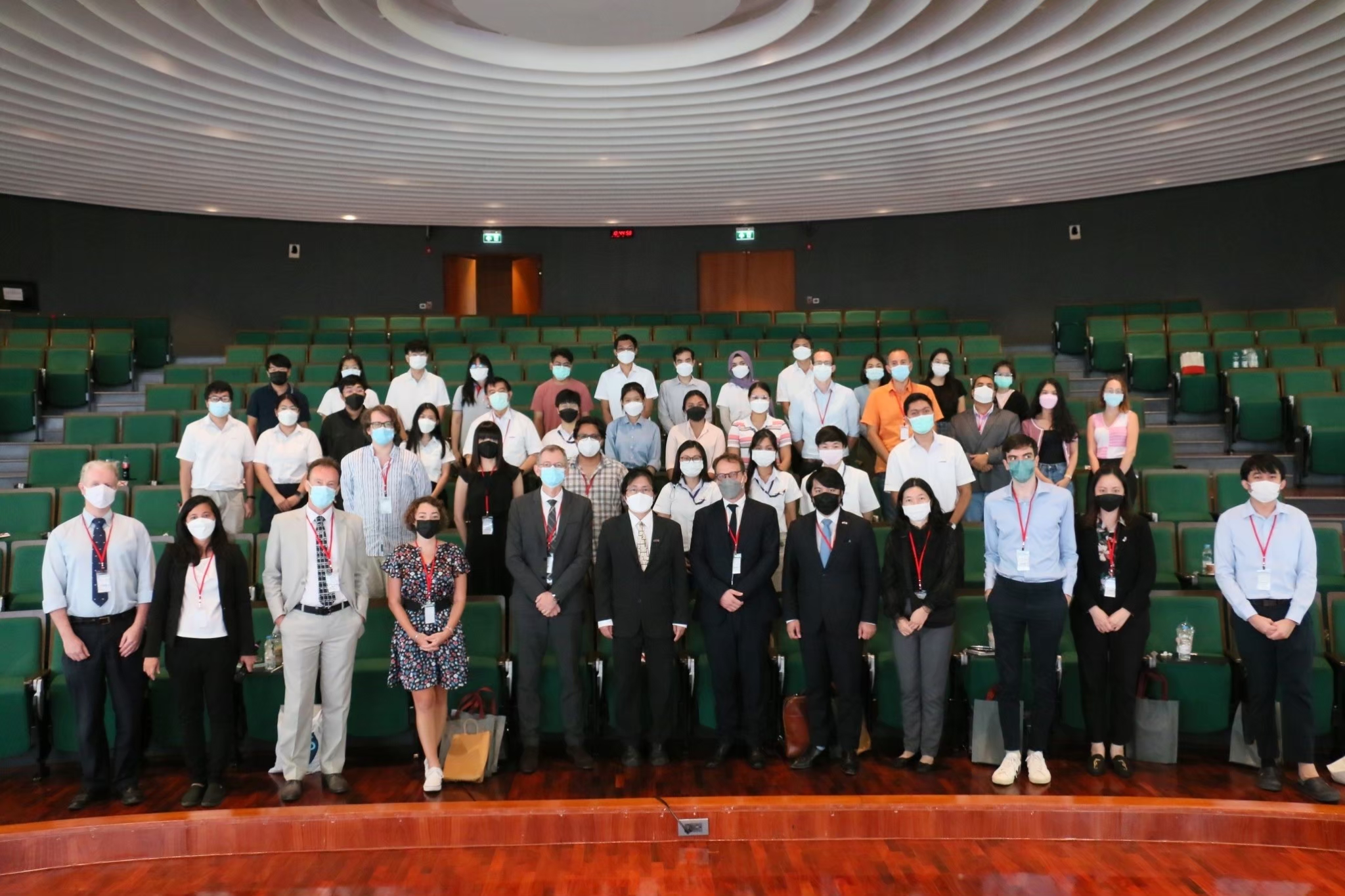
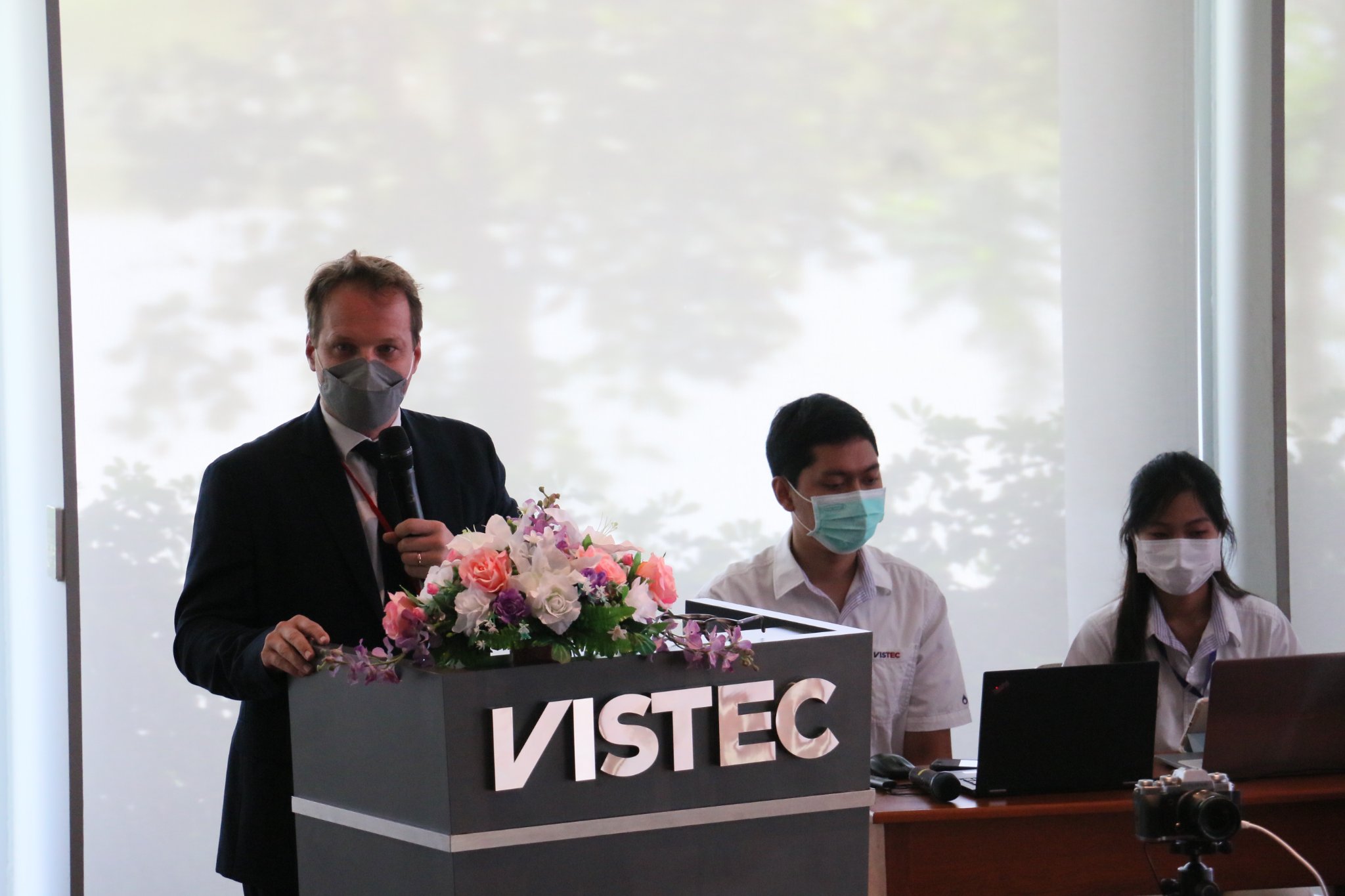
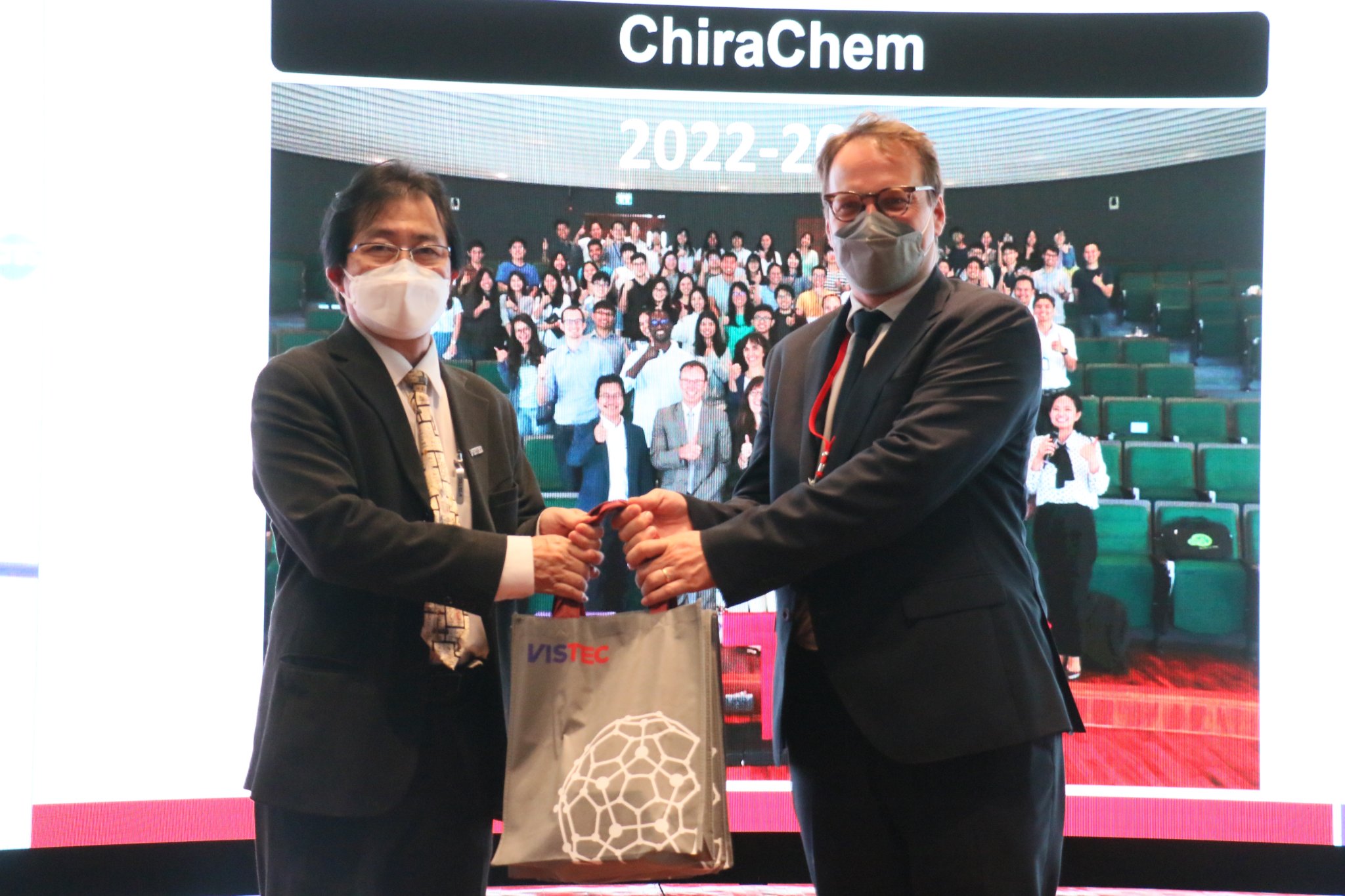
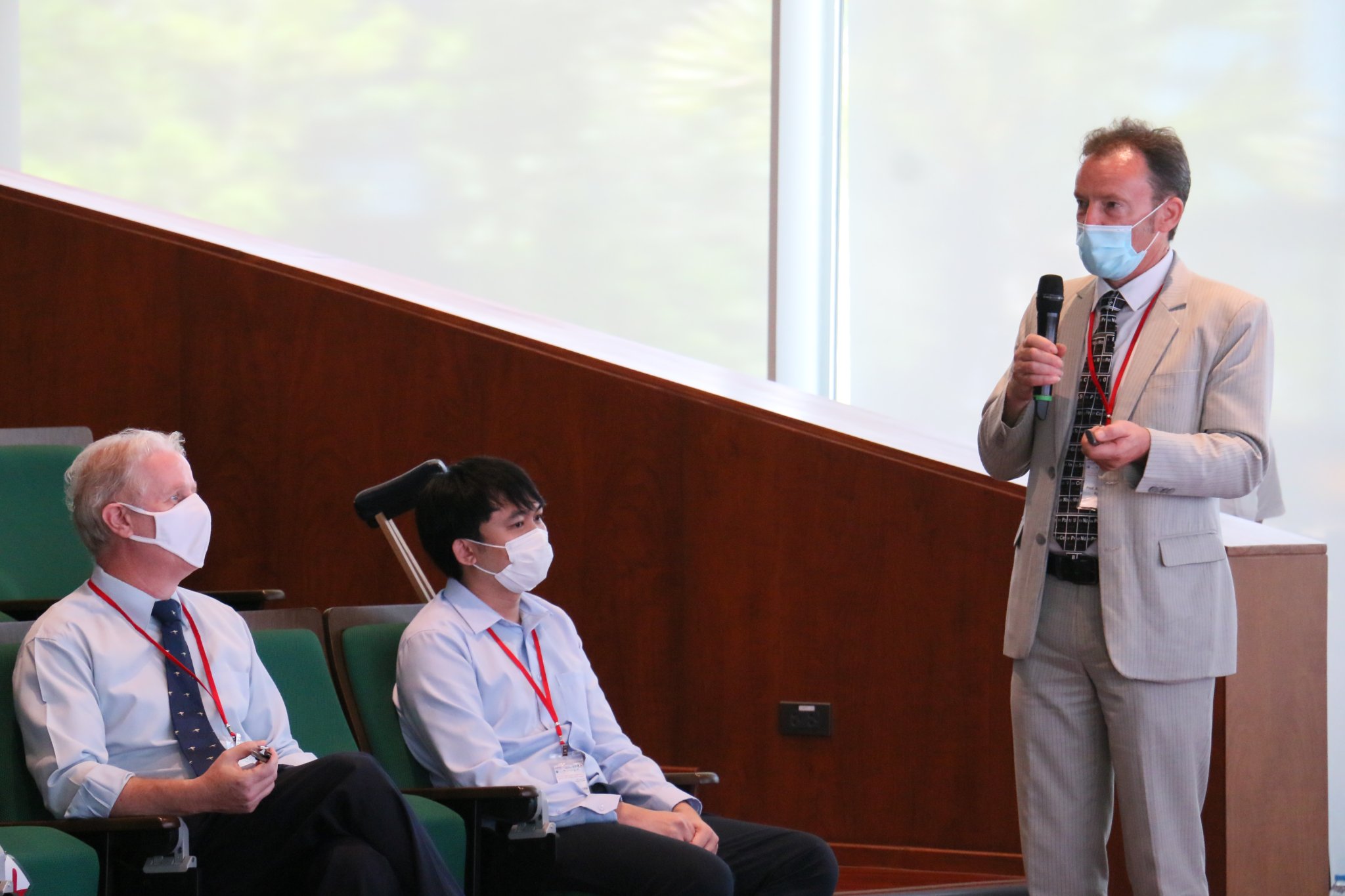

The 9th Franco-Thai Symposium
On 30th May 2023, France
We have organized the 9th Franco-Thai Symposium at Bordeaux INP in relation with the International Research Project (IRP) « ChiraChem » supported by CNRS and the Global League-2023 by PMU-B to further strengthen the fruitful collaboration between France (Prof. Alexander Kuhn, University of Bordeaux & Dr. Gabriel Loget, University of Rennes) and Thailand (Assoc. Prof. Chularat Wattanakit & Prof. Adrian Flood, Vidyasirimedhi Institute of Science and Technology (VISTEC)). First, Prof. Isabelle Gosse, Director of ENSMAC, gave the opening-speech to welcome all guests. Then the two PI partners, Prof. Alexander Kuhn and Assoc. Prof. Chularat Wattanakit explained the importance of the collaboration, past achievement, and the future evolution of the collaboration. During the whole day scientific perspectives regarding chirality and related topics were exposed by researchers from several partners.



ChiraChem Symposium 2024 at VISTEC is a Showcase of a Very Successful French-Thai Collaboration on Research and Education.
Vidyasirimedhi Auditorium was the main venue for the meeting of French-Thai Collaboration on Wednesday 10 April with the title “ChiraChem Symposium 2024”.
Presence among prominent French and Thai scholars are
(1) Professor Dr. Pimchai Chaiyen as the President of VISTEC,
(2) Professor Dr. Dominique Baillargreat as the Regional Director of the CNRS Representative Office in ASEAN,
(3) Professor Dr. Xavier Grosmaitre as the Science and Higher Education Attache
(4) Professor Dr. Alexander Kuhn-Associate Professor Dr. Chularat Wattanakit as the key founders of ChiraChem.
Professor Alexander Kuhn mentioned at the meeting that “ChiraChem has its roots from a long-term collaboration that started in 2006 with Professor Jumras Limtrakul and continued in 2015 with Associate Professor Chularat Wattanakit”.
Altogether 15 research papers were presented at the symposium by French and Thai scientists. Dr. Laurent Bouffier from Bordeaux University who participated in the Franco-Thai Symposium in 2017 told us, “ We had the meeting in the Pailin Auditorium at that time and I could see the marvelous VISTEC already. Coming to VISTEC in 2024, I witnessed so many developments both in science and the infrastructure of the institute. The good nucleation that VISTEC had at the beginning resulted in a beautiful crystal growth”.


